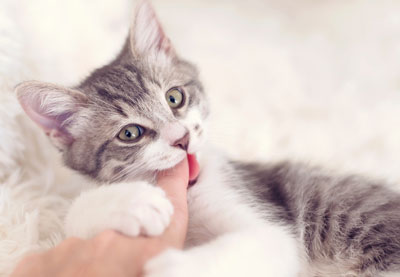What to Do About Cats That Bite

It's an extremely common thing for people with cats to ask about: why is my cat biting me or the other pets in my home?
It's an important question, but the answer isn't always immediately apparent.
Causes of Feline Aggression
The most common causes of feline aggression include:
- Play aggression. This occurs when a cat is playing and bites fingers, toes, or clothing as part of the game. Adult cats may still do this if they were separated from their mom and litter before they were taught proper playing manners. You can learn more here: "Play Aggression in Cats."
- Territorial aggression. This can occur in any cat, but it's more common in males that aren't neutered followed by females that aren't spayed. For more specifics, check here: "Territorial Aggression in Cats."
-
Petting-induced aggression. This occurs when you are petting your cat. Usually, she appears to be enjoying the petting but then suddenly turns and bites. For further information, read this article: "Petting Induced Aggression in Cats."
- Injury or illness-related aggression. A cat that is ill or in pain may bite defensively or out of fear of more pain. Learn more here: "Injury or Illness-Related Aggression in Cats."
- Redirected aggression. This type of attack occurs when a cat is frustrated or hyper-stimulated by something that she can't directly deal with, such as an intruder cat or prey animal seen through a window. It also happens when a cat is scared by something like a loud crash and, thinking it came from a person or pet in the home, becomes obsessed with "defending" herself against that housemate. Find out more here: "Redirected Aggression in Cats."
What Can You Do About a Cat Behaving Aggressively
While it's best to identify the exact cause of your cat's aggression to determine specific treatments, there are some general things you can do in all situations.
- Visit the veterinarian. Always check with your veterinarian when a new behavior develops in your cat. He or she is your best source of information and can check for a medical reason for the aggression.
- First and foremost, stay safe. Cat bites are extremely dangerous, often resulting in bad infections and tissue damage. Take precautions to keep yourself from being bitten. Never intervene directly in a cat fight; instead, make a loud noise or spray some water toward the cats to distract them.
- Consider using Feliway in your home. It is a product that mimics the feline facial pheromone that mother cats use to calm their kittens, and it can promote a calm atmosphere for the cat(s) in your home, as well. You can learn more here: "Feliway - A Useful Tool to Help Treat Stress in Cats."
- Make sure your cat is getting plenty of play time, to release energy and ensure that she is getting enough attention. Wand toys and those that mimic rodents are often the best at letting out a cat's predator instincts to help her remain calmer.
- Be sure to provide your cat with outlets for stress and territorialism. Scratching posts are especially important because they serve the double purpose of allowing a cat to mark territory and also relieve stress. You can learn more and find more stress-reducing ideas here: "Stress in Cats."
- Never punish your cat by hitting. Yelling at or hitting your cat for being aggressive never helps. Instead, it escalates the behavior in most cases because it causes fear and confusion.
- Spend time training your cat. Clicker training is a great way to train cats, can increase your bond with your kitty, and can help you teach your cat what you want him to do in many situations, including when he is being aggressive. Learn more here: "Clicker Training for Cats: An Overview."
- Read the individual articles linked to in the section above for more specific information. You may be able to find clues to the cause of your individual cat's aggression in those articles along with tips specific to them.
You May Also Like These Articles:
How to Introduce a New Cat to a Household that Already Has a Cat
STOMP out Problem Cat Scratching
Why Your Cat Scratches Some Areas of Your Home and Not Others
Special Cat Scratching Post Considerations for Multiple Cats
Human-directed Aggression in Cats
Cat Aggression: Why Some Cats Fight
Notice: Ask-a-Vet is an affiliated service for those who wish to speak with a veterinary professional about their pet's specific condition. Initially, a bot will ask questions to determine the general nature of your concern. Then, you will be transferred to a human. There is a charge for the service if you choose to connect to a veterinarian. Ask-a-Vet is not manned by the staff or owners of CatHealth.com, and the advice given should not delay or replace a visit to your veterinarian.





